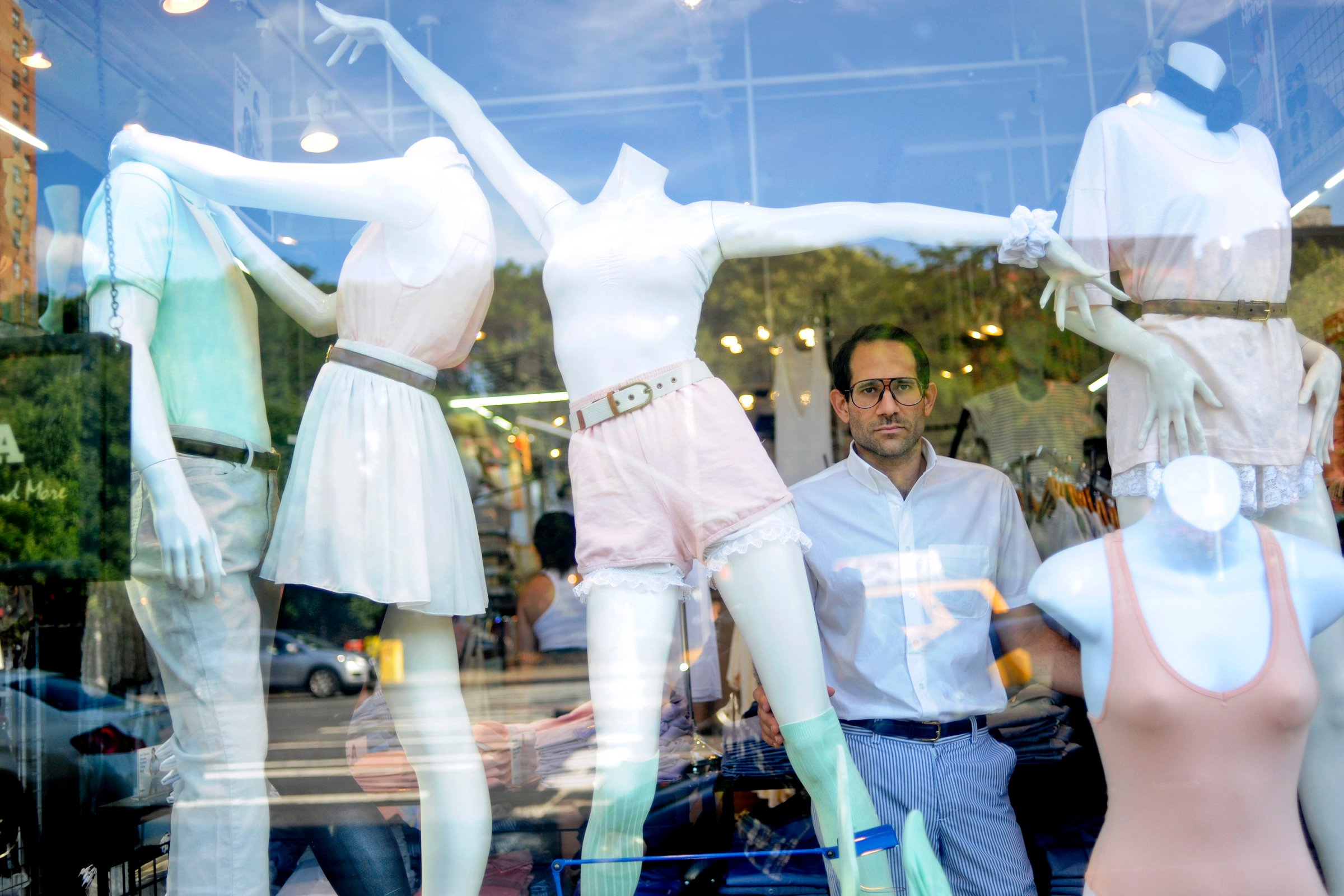
Dov Charney and Terry Richardson are like the weird uncles of the fashion world, complete with ’70s glasses, questionable facial hair and a tendency to strip down when you least expect it.
They have another thing in common: both Charney and Richardson have built their brands on selling sex. As founder and CEO of American Apparel, Charney is especially fond of showing pubic hair and using semi-nude teenage models in his ads, and was known for walking around his factories in his underwear. And Richardson, one of the most famous photographers in fashion, has photographed his own face drenched in semen and is known for getting naked (and becoming erect) during photo shoots with female models (he says it’s to make the models feel more comfortable).
At first, the controversies around their personal behavior brought attention and buzz to their envelope-pushing work. But sex only sells until it stops seeming edgy, and that day may have come for both Charney and Richardson. Ultimately, the sex factor that launched their careers may morph into a smutty reputation that brings them down.
And it would not be entirely surprising. Both Charney and Richardson have been accused of harassing women they work with for years. Both have been named in multiple sexual-harassment lawsuits. In 2008, Charney, 45, was accused of keeping a teenage employee as his “sex slave” (she said he coerced her into performing oral sex by threatening that she would lose her job). He’s also been sued for sexual harassment by multiple other employees and models, but all the lawsuits against him have been dismissed or settled out of court. And Richardson, 48, has been sued at least twice by former models (both lawsuits were settled) and has been accused at least nine times of sexual weirdness during photo shoots. (Requests for comment from Richardson and from American Apparel were not returned.)
We’ve known about these allegations for a long time, and until now, both men seemed to weather the storms of bad press.
But on Wednesday night, the board of American Apparel dismissed Charney amid “ongoing investigation into alleged misconduct.” They didn’t identify a specific case, but an anonymous source told the Los Angeles Times that the “misconduct” involved Charney’s bad behavior with women. In other words, the sexual weirdness that left a bad taste six years ago is completely unpalatable now.
Charney’s story is like a Shakespearean porno — the sex-infused imagery that sold his clothes became the smut that sank his career. It is a sign that times have changed. Behavior that used to be tolerated as the price of working with an eccentric genius is now considered unacceptable. No matter how cool you are, you don’t get a “free pass” if the public concludes you’re taking advantage of women.
Richardson hasn’t been dumped like Charney, but a recent profile in New York magazine shed light on some of his stranger sexual proclivities and how they’ve affected his career — the article was titled “Is Terry Richardson an Artist or a Predator?” Magazines like Vogue and fashion companies like Target Style and H&M have said they have “no future plans” to work with Richardson. A Change.org petition to get big brands to stop employing Richardson has already gained over 34,000 signatures.
And Charney’s antics didn’t seem to be helping his company. American Apparel had been hemorrhaging money in the years since Charney’s lawsuits started, and lost over $396 million since 2009 (the company wasn’t in total free-fall the whole time, but the overall financial picture looked bleak). Yet in the hours after Charney’s dismissal, stock rose 20%.
To be fair, Charney’s leadership wasn’t all bad. His commitment to making all of American Apparel’s clothing in the U.S. and supporting fair wages for workers is certainly admirable. After the tragic collapse of a factory in Bangladesh last year, Charney wrote that “the apparel industry’s relentless and blind pursuit of the lowest possible wages cannot be sustained over time, ethically or fiscally.”
But Charney’s narrative is familiar to any girl who’s found out the hard way that sex sells and sells and sells, until it the moment it doesn’t. Just ask Miley Cyrus when she turns 40 (or, for that matter, Madonna). Where sexual women are slut-shamed, Charney and Richardson are being smut-shamed, as well they should be. Unlike girls who simply express their sexuality, Charney and Richardson are accused of taking advantage of women less powerful than themselves. That’s what’s really shameful.
Women have known for years that sex can have social consequences, unfair as they may be. Maybe men are finally getting a taste of that medicine.
More Must-Reads from TIME
- Donald Trump Is TIME's 2024 Person of the Year
- Why We Chose Trump as Person of the Year
- Is Intermittent Fasting Good or Bad for You?
- The 100 Must-Read Books of 2024
- The 20 Best Christmas TV Episodes
- Column: If Optimism Feels Ridiculous Now, Try Hope
- The Future of Climate Action Is Trade Policy
- Merle Bombardieri Is Helping People Make the Baby Decision
Write to Charlotte Alter at charlotte.alter@time.com